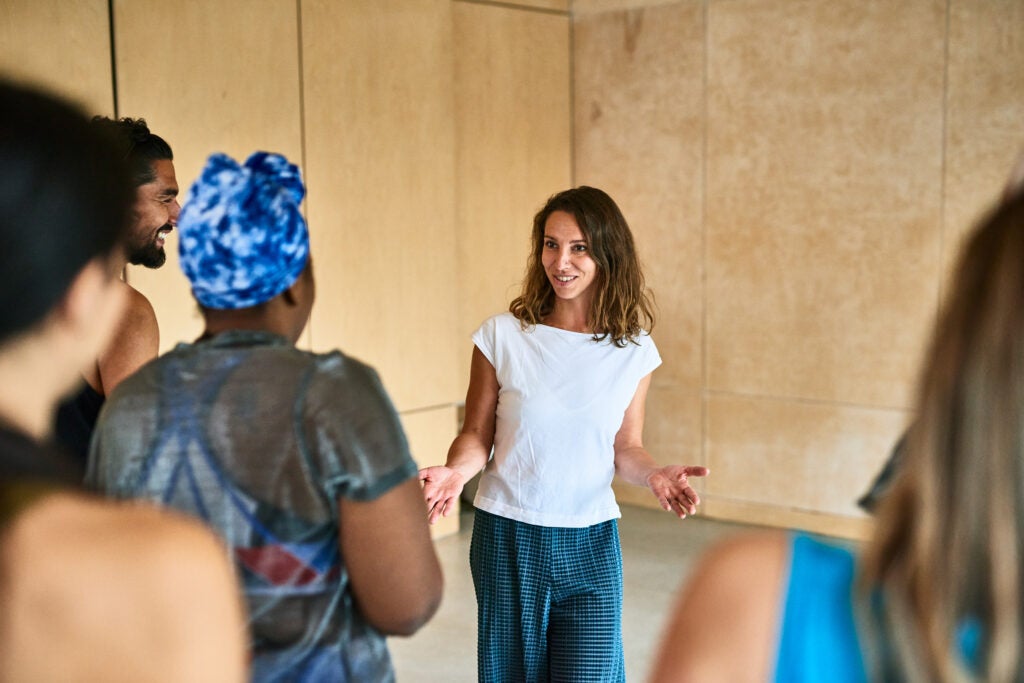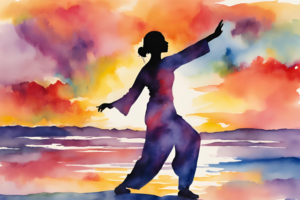The best way to Cease Oversharing as a Yoga Instructor

“], “filter”: { “nextExceptions”: “img, blockquote, div”, “nextContainsExceptions”: “img, blockquote, a.btn, a.o-button”} }”>
Heading out the door? Learn this text on the brand new Outdoors+ app accessible now on iOS units for members!
>”,”title”:”in-content-cta”,”sort”:”hyperlink”}}”>Obtain the app.
Yoga class generally is a supportive group through which lecturers really feel secure sufficient to talk brazenly to college students. Typically *very* brazenly. I keep in mind a trainer who waxed on so colorfully in regards to the particulars of her newest movie star crush that she had me laughing even whereas holding Chair Pose for much longer than normal. I appreciated the persona—and the leg-strengthening work—she dropped at her instructing.
However I’ve additionally taken courses through which different college students and I shifted uneasily in our Simple Seats as lecturers digressed into lengthy, uncomfortable monologues about their relationships with their moms or intimate companions. As a yoga trainer, I admit I’m responsible of getting overshared. I as soon as left a category through which I’d taught mula bandha kicking myself—there was zero (zero!) want for me to say my very own pelvic flooring to college students.
“I’ve heard all of it,” says Barbara Agnello, PhD, a conduct analyst and co-owner of Excessive Frequency Loft, a motion area in Taos, NM. “I’ve heard about pregnancies, divorces, miscarriages, deaths, breakups, new boyfriends, and outdated girlfriends. And I’m not there for that,” she says. Juliana Anastasoff, a longtime public well being educator, agrees. “A studying group like a yoga class may be extraordinarily supportive on all types of ranges, nevertheless it’s not a help group,” she provides.
For yoga lecturers, discovering the road between applicable and inappropriate sharing may be difficult. However holding just a few issues in thoughts—similar to what, when, and why you share—can assist you retain your self-disclosures inside a cringe-free zone.
Acceptable Methods to Share Throughout Yoga Class
“’Self-disclosure’ is the sharing of non-public details about your self since you imagine that it’ll assist one other individual,” says Anastasoff. A yoga trainer would possibly self-disclose once they clarify the non-public relevance of a follow or a pose, or once they relate to a pupil who confides in them a couple of private drawback or damage.
Typically these self-disclosures may be helpful. “Sharing private tales generally is a stunning, impactful a part of instructing when the circumstances are proper,” observes Reema Datta, worldwide yoga trainer and creator of The Yogi’s Approach: Remodel Your Thoughts, Well being and Actuality.
Sharing just a few phrases about their imperfections or struggles can assist yoga lecturers come throughout as extra relatable and, effectively, human. “We’re typically making an attempt to let someone know that we really feel the identical approach, or that we have now felt that approach,” says Agnello. “If the yoga trainer is so zen, I’ll say to myself, ‘They don’t know what life is like,’” she provides.
The Dangers of Oversharing With Your Yoga College students
Though the intention of a yoga trainer who shares a private expertise could also be to help college students, the outcome can fall brief. Typically dramatically so. This dynamic may very well burden college students to the purpose the place their focus is on the trainer’s points as a substitute of their yoga follow, in accordance with Anastasoff. “Now college students are apprehensive in regards to the teacher as a substitute of about their very own well-being,” she says. “You’ll be able to see it of their faces.”
Self-disclosures can run the emotional gamut, however the extra painful an expertise was for you, the extra circumspect you need to be about sharing it. Upsetting private tales may be disruptive to many college students who’re feeling fragile, even perhaps reawakening their very own distressing reminiscences, which might distract them throughout their yoga follow.
College students could also be moved to share comparable experiences, and sophistication may shortly flip right into a sharing circle and even descend into one-upmanship. “We may begin making an attempt to trump one another, like, ‘My trauma is worse than yours.’ That doesn’t actually do any good, and we may all get so locked in that trauma vortex we’re not in a position to entry our yoga,” explains Agnello.
The dangers of oversharing prolong not solely to college students however to instructors. Sure, chances are you’ll cringe afterward as you mirror on what you’ve revealed. But in addition, as Agnello factors out, yoga class isn’t a confidential surroundings. The knowledge you shared could go additional than you need. “Any pupil can go away that class and inform all people they meet on the road what they heard, and earlier than you realize it, the entire city is aware of about your divorce,” says Agnello.
The best way to Cease Oversharing
In terms of figuring out what you do and don’t share, the rules of yoga–particularly, brahmacharya–can maybe be a guiding pressure. This yama, typically translated as “continence,” “encourages moderation and considerate restraint,” explains Datta. “We are able to share private tales with a way of containment to make sure they don’t create unintended distractions or shift focus away from college students.”
Specializing in the scholars and what serves them is paramount, says Anastasoff. “You’ve obtained to know what’s motivating you. If what’s motivating you is service, which facilities the learner, their expertise, their wants, then you realize your story isn’t so necessary,” she says. In that case, maybe it’s not essential to share it.
Based on Anastasoff, an necessary skilled follow for all instructors is self-reflection, and “a part of self-reflection is holding just a few questions in your head.” Her checklist contains:
- Why am I sharing this? What’s my intention?
- Is what I’m sharing related?
- How will sharing it have an effect on me?
- How will it have an effect on the group I’m a part of? Will it burden them or profit them?
Even when your intention is a laudable one—similar to making a connection along with your college students— chances are you’ll uncover that one thing you’re inclined to share advantages solely you and never your college students.
Thankfully, talking about your self isn’t the one approach of making a connection. “Your listening, your presence, your abilities are what’s going to make that connection occur,” says Anastasoff.
In case you decide that what you must share is related and of direct profit to college students, you should still must restrict your self-disclosures. “I believe we simply must be actually conscious a couple of secure container, a brief container, so we don’t get caught or put our foot in our mouth,” advises Agnello.
When she makes use of herself for instance at school, she makes certain to maintain it temporary and basic. “I’ll say, ‘I are typically excessive strung,’ or ‘I are typically a bit of anxious. So I’m going to exhale and let that anxiousness go, and inhale calmness,’” says Agnello. “I believe that’s basic sufficient to share and never scare,” she provides.
Figuring out what is suitable so that you can share whilst you educate takes follow, and it might not be one thing you do completely each time. As your yoga follow helps you refine your consciousness, chances are you’ll grow to be extra attuned to the refined shifts in your exterior and inside environments that point out you’ve moved into the realm of oversharing. It’s possible you’ll really feel the vitality within the room change along with your college students’ discomfort, or a rising sense of interior precariousness as you drift away from service. If that’s the case, take a breath and, as Agnello suggests, return your focus to the follow of yoga. “That’s why we’re right here,” she says.







